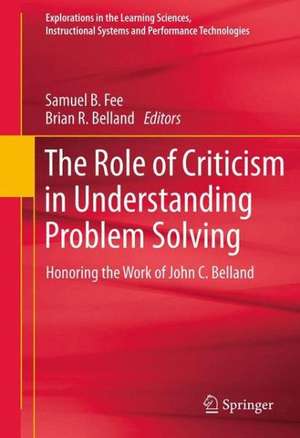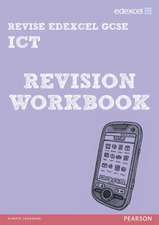The Role of Criticism in Understanding Problem Solving: Honoring the Work of John C. Belland: Explorations in the Learning Sciences, Instructional Systems and Performance Technologies, cartea 5
Editat de Samuel Fee, Brian Bellanden Limba Engleză Paperback – 11 iun 2014
| Toate formatele și edițiile | Preț | Express |
|---|---|---|
| Paperback (1) | 639.25 lei 43-57 zile | |
| Springer – 11 iun 2014 | 639.25 lei 43-57 zile | |
| Hardback (1) | 645.47 lei 43-57 zile | |
| Springer – 27 mai 2012 | 645.47 lei 43-57 zile |
Preț: 639.25 lei
Preț vechi: 752.06 lei
-15% Nou
Puncte Express: 959
Preț estimativ în valută:
122.32€ • 128.05$ • 101.21£
122.32€ • 128.05$ • 101.21£
Carte tipărită la comandă
Livrare economică 07-21 aprilie
Preluare comenzi: 021 569.72.76
Specificații
ISBN-13: 9781489998194
ISBN-10: 1489998195
Pagini: 272
Ilustrații: VIII, 264 p.
Dimensiuni: 155 x 235 x 14 mm
Greutate: 0.39 kg
Ediția:2012
Editura: Springer
Colecția Springer
Seria Explorations in the Learning Sciences, Instructional Systems and Performance Technologies
Locul publicării:New York, NY, United States
ISBN-10: 1489998195
Pagini: 272
Ilustrații: VIII, 264 p.
Dimensiuni: 155 x 235 x 14 mm
Greutate: 0.39 kg
Ediția:2012
Editura: Springer
Colecția Springer
Seria Explorations in the Learning Sciences, Instructional Systems and Performance Technologies
Locul publicării:New York, NY, United States
Public țintă
ResearchCuprins
-1. Argumentation, Critical Reasoning and Problem Solving. -2. Postmodernism: A 21st Century Primer to Problem-based Learning.-3.What Does a Connoisseur Connaît?-4. Developing a Critical Stance as an E-Learning Specialist: A Primer for New Professionals.-5. Critical Theory and the Mythology of Learning with Technology.-6. Habitus, Scaffolding, and Problem-based Learning: Why Teachers' Experiences as Students Matter.-7.The Aesthetics of Game-based Learning: Applying John C. Belland’s Connoisseurship Model as a Mode of Inquiry.-8. Integrating Metacognitive Prompts and Critical Inquiry Process Display to Scaffold Learners’ Development of Problem Solving Skills.-9. A Models and Modeling Perspective on Complex Reasoning Contrasted with Problem-Based Learning.-10. Problem-Based Learning in Online Teacher Education.-11. The Fallacies of Problem-Based Learning Viewed as in a Hermeneutic Perspective of Better Teaching Practices.-12. Design for Media (D4M): Nurturing the Transition of Media Arts Students from Consumers to Producers through the Application of Design and Color Theory.-13. Genetic Literacy and Problem-Based Learning.-14. Correlating Problems throughout an Interdisciplinary Curriculum.-15. Ethical angles on service learning.-16. Conclusions: Critical Theory, PBL, and Educational Technology.
Textul de pe ultima copertă
The concept of criticism as a tool for research, although well established in other educational research traditions, is not well established in the domain of Educational Technology. This book changes all that by substantiating criticism as a way to step back and critically evaluate an educational intervention within educational technology. Doing so provides an valuable approach for researchers in terms of guiding meta analyses and theoretical studies, preventing the proverbial "spinning of the wheels" that often happens in educational research.
The book looks back to the seminal work in the field, Paradigms regained: the uses of illuminative, semiotic, and post-modern criticism as modes of inquiry in educational technology - a book of readings by Denis Hylinka and John Belland, as a guidepost and then extends and updates the ideas found within it. But the authors do much more then merely take that work forward. They re-evaluate it, consider the state of the field today, and propose ways in which educational researchers might think of heading forward in their studies of the theory that drives practices in educational technology and instructional design.
The authors revisit the ideals of criticism, establishing their usefulness for studying Educational Technology interventions supporting problem based learning. Through the use of focused, specific case studies, the book provides a multitide of new research questions and directions and proves criticism can profoundly invigorate the field of educational research.
This book was written to provide not only a reconsideration of pre-existing knowledge, but as an originator of new ideas. It represents a complete overhaul and rethinking of the use of criticism as a method for understanding and furthering the research area of PBL within the field of Educational Technology and Instructional Design ; it will prove, however, to be an important resource forresearchers working in any area of Educational Technology who are hungry for a new approach to research.
The book looks back to the seminal work in the field, Paradigms regained: the uses of illuminative, semiotic, and post-modern criticism as modes of inquiry in educational technology - a book of readings by Denis Hylinka and John Belland, as a guidepost and then extends and updates the ideas found within it. But the authors do much more then merely take that work forward. They re-evaluate it, consider the state of the field today, and propose ways in which educational researchers might think of heading forward in their studies of the theory that drives practices in educational technology and instructional design.
The authors revisit the ideals of criticism, establishing their usefulness for studying Educational Technology interventions supporting problem based learning. Through the use of focused, specific case studies, the book provides a multitide of new research questions and directions and proves criticism can profoundly invigorate the field of educational research.
This book was written to provide not only a reconsideration of pre-existing knowledge, but as an originator of new ideas. It represents a complete overhaul and rethinking of the use of criticism as a method for understanding and furthering the research area of PBL within the field of Educational Technology and Instructional Design ; it will prove, however, to be an important resource forresearchers working in any area of Educational Technology who are hungry for a new approach to research.
Caracteristici
Establishes criticism as a valuable tool for research in Educational Technology Provides case studies to fully explain the role for criticism in PBL research Proposes a fresh new approach to solve complex research questions within Educational Technology Introduces a new method for data analysis and analysis of research results in PBL Includes supplementary material: sn.pub/extras










